Gary Payton (Part 2)
Gary Payton (Part 2)
During the 2002–03 NBA season, midway through the campaign at the trade deadline, Gary Payton found himself traded to the Milwaukee Bucks, alongside Desmond Mason, as part of a significant deal that involved Ray Allen, Kevin Ollie, Ronald Murray, and a 2003 first-round draft pick. Payton swiftly adjusted to his new team, making an immediate impact in the remaining 28 games of the season. He showcased his scoring prowess and playmaking abilities, averaging an impressive 19.6 points and 7.4 assists per game.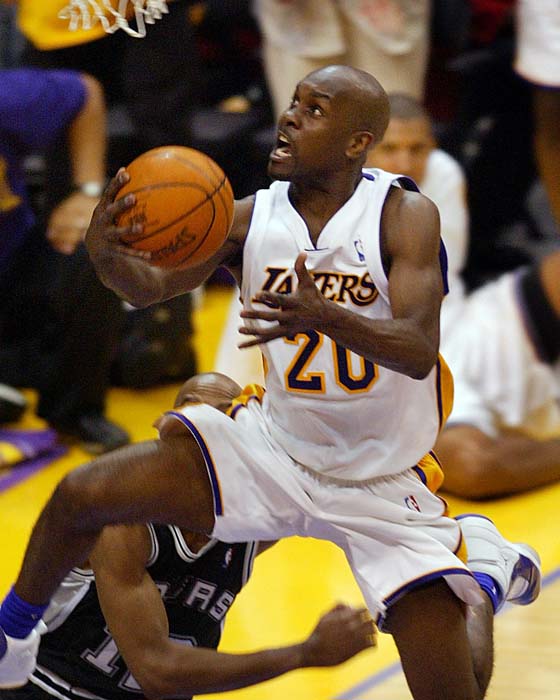
In the postseason, the Bucks faced the formidable New Jersey Nets, the defending Eastern Conference champions, in the first round. Despite being considered underdogs, the Bucks put up a valiant effort, pushing the Nets to a competitive six-game series. Payton emerged as a leader for the Bucks, leading the team in both scoring, with an average of 18.5 points per game, and assists, averaging 8.7 assists per game, throughout the series. His standout performance included a remarkable 20-point, 14-assist display in Game 4, contributing significantly to Milwaukee's victory in that game.
Although the Bucks ultimately fell short against the more experienced and well-rounded Nets, Payton's contributions during his brief stint with the team left a lasting impression. His ability to elevate his game in crucial playoff matchups demonstrated his enduring impact and legacy as one of the premier guards in NBA history.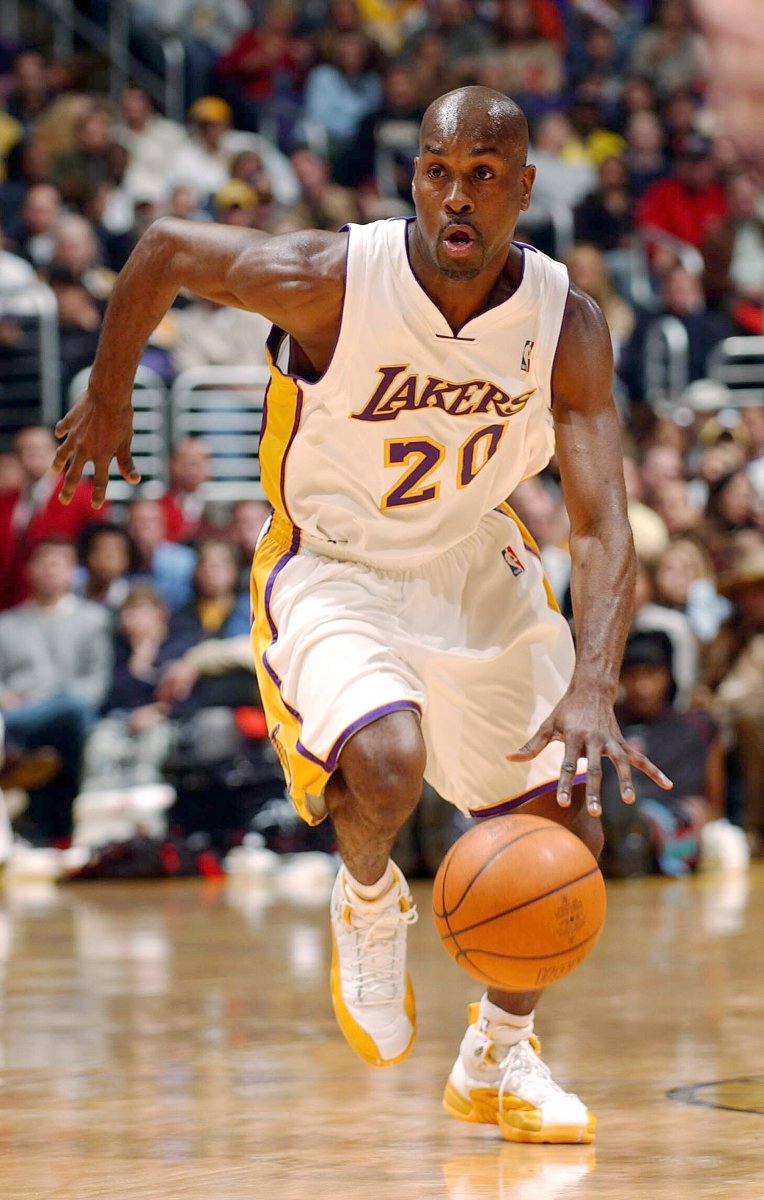
As an unrestricted free agent ahead of the 2003–04 NBA season, Gary Payton, alongside Karl Malone, made a high-profile move to join the Los Angeles Lakers in pursuit of their first NBA Championship. Payton immediately became a key figure for the Lakers, starting in all 82 games of the regular season. Despite adapting to Lakers coach Phil Jackson's triangle offense, which posed challenges to his traditional style of play, Payton maintained a solid performance, averaging 14.6 points, 5.5 assists, and 1.2 steals per game.
Throughout the season, Payton showcased his offensive prowess, particularly in games where star teammates Shaquille O'Neal or Kobe Bryant were sidelined due to injuries. Notably, he exploded for a 30-point performance in an overtime victory against the Cleveland Cavaliers on February 4, demonstrating his ability to step up when needed.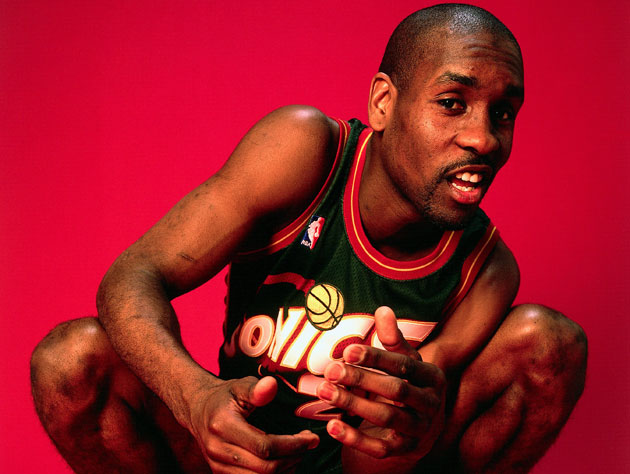
Despite injuries hampering key players such as Malone, O'Neal, and Bryant, the Lakers managed to win 56 games and secure the Pacific Division title. In the playoffs, Payton's contributions remained vital, despite a slight dip in scoring production to 7.8 points per game. He notably delivered clutch performances, scoring 15 points in pivotal games against the San Antonio Spurs in the semifinals and tallying 18 points and nine assists in Game 3 of the Western Conference Finals against the Minnesota Timberwolves.
The Lakers ultimately advanced to the NBA Finals, but fell short against the formidable Detroit Pistons in a five-game series. Despite the disappointment of falling short of the championship, Payton's tenure with the Lakers showcased his ability to adapt to new systems and contribute to a championship-caliber team, further solidifying his legacy as one of the NBA's all-time greats.
Before the start of the 2004–05 NBA season, the Los Angeles Lakers orchestrated a trade involving Gary Payton and Rick Fox, sending them to the Boston Celtics in exchange for center Chris Mihm, small forward Jumaine Jones, and point guard Chucky Atkins. Despite initial discontentment with the trade, Payton honored his commitment and joined the Celtics for the upcoming season, assuming the role of the team's starting point guard.
However, Payton's tenure with the Celtics was short-lived. On February 24, 2005, he was traded to the Atlanta Hawks as part of a deal that brought Antoine Walker back to Boston. Surprisingly, the Hawks waived Payton immediately after the trade, rendering him a free agent. Within a week, Payton returned to Boston, where he had started all 77 games he played during his stint with the team.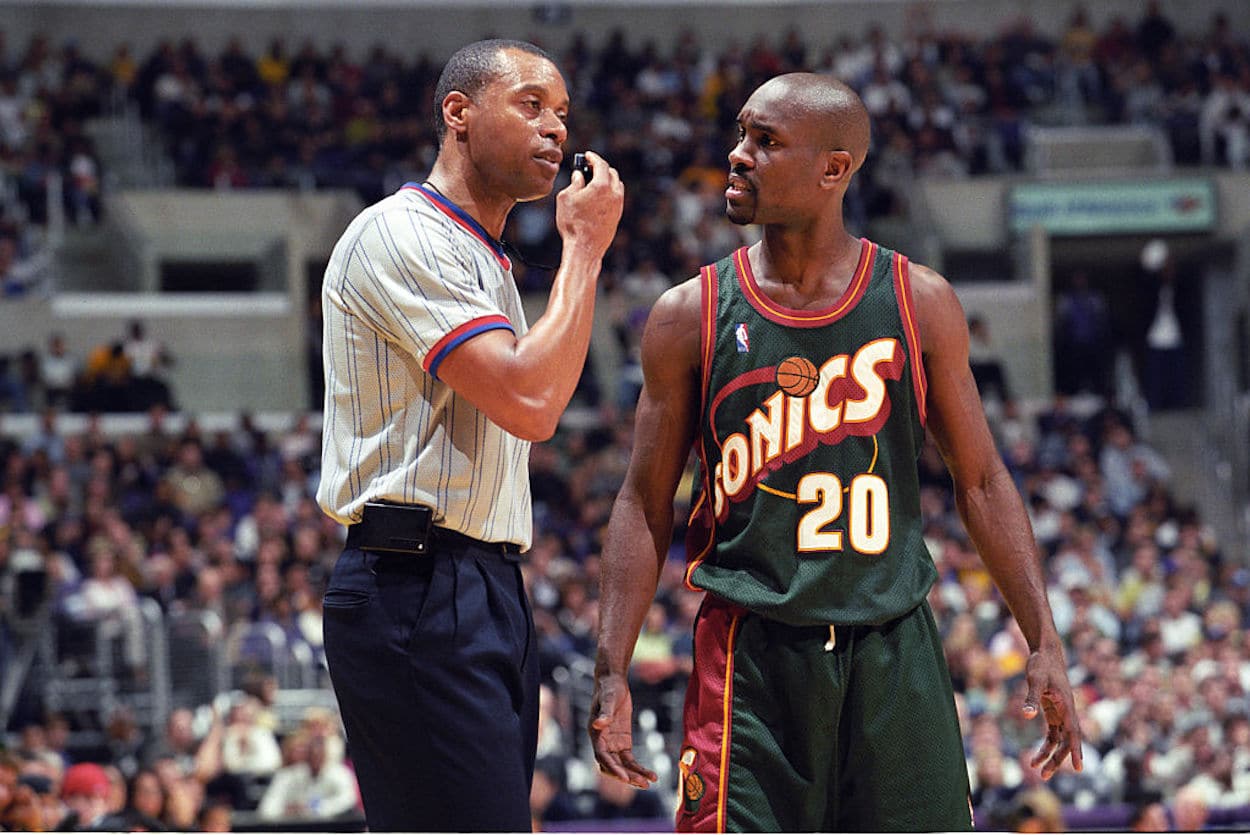
Throughout the 2004–05 season, Payton's contributions were significant for the Celtics as they clinched the Atlantic Division title. He averaged 11.3 points and 6.1 assists per game, playing a pivotal role in the team's success. Despite their regular-season achievements, the Celtics were eliminated in the first round of the playoffs by the Indiana Pacers.
Payton's resilience and professionalism were evident as he navigated through various trades and transitions during the season, ultimately making meaningful contributions to the Celtics' campaign. Despite the team's postseason disappointment, Payton's impact on the court and veteran leadership were invaluable assets for Boston during the 2004–05 season.
On September 22, 2005, Gary Payton inked a one-year contract worth $1.1 million with the Miami Heat, marking a reunion with former teammates Antoine Walker and Shaquille O'Neal, both acquired by the Heat earlier that year. Acting as a backup to Jason Williams, Payton played a crucial role off the bench, averaging 7.7 points and starting 25 out of 81 games during the regular season. Despite his reduced role, Payton remained a reliable presence, especially during pressure situations in the fourth quarter of games.
In the playoffs, Payton's veteran experience shone through as he made significant contributions to the Heat's postseason run. In Game 4 of the semifinals against the New Jersey Nets, Payton's clutch three-pointer with 56 seconds remaining helped secure a crucial victory for Miami. He continued to make key plays throughout the Eastern Conference Finals, including a 14-point performance in Game 1 against the Detroit Pistons, setting the tone for the series. Miami ultimately prevailed in six games, advancing to their first-ever NBA Finals matchup against the Dallas Mavericks.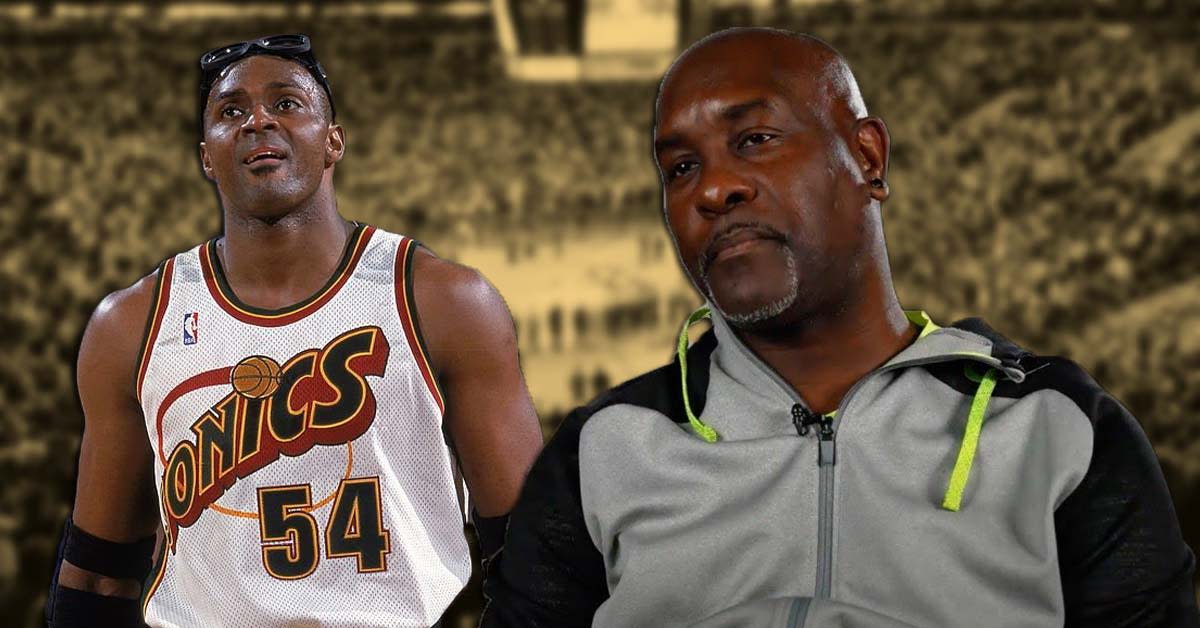
Facing the Mavericks in the Finals, the Heat found themselves trailing in Game 3 before staging a remarkable comeback, with Payton delivering a game-winning jump shot off a pass from Jason Williams. In Game 5, Payton once again played a pivotal role, scoring 8 points, including a crucial field goal in the closing seconds to secure a narrow victory for Miami. The Heat clinched their historic NBA title in Game 6, with Payton contributing to the victory.
Following the championship triumph, Payton re-signed with the Miami Heat on September 6, 2006, for another one-year contract worth $1.2 million. Throughout the 2006–07 NBA season, Payton continued to climb up various all-time NBA lists, solidifying his status as one of the league's greatest players. He moved up to 8th in all-time NBA games played, 7th in all-time minutes played, and became the 21st-highest scorer in NBA history, surpassing legends like John Havlicek, Robert Parish, Hal Greer, and Larry Bird.
References
- Adande, J. A. (November 6, 2012). "West Side: Mike Brown's O is working". ESPN.com. Archived from the original on November 9, 2012.
- ^ Ence, Jason (March 30, 2021). "Top 10 players with the most technical fouls in NBA history". The TwinSpires Edge. Retrieved May 9, 2022.
- ^ Phillips, DeAndre The Gift of Gab, nba.com. Retrieved June 13, 2007.
- ^ "New Jersey Nets Basketball". New York: NY Daily News. Archived from the original on May 22, 2006. Retrieved September 21, 2010.
- ^ Video on YouTube
- ^ Gary Payton at 2001 All-Star Game Pre-Game (video), youtube.com. Retrieved January 17, 2014.
- ^ "player profile". NBA.com. Archived from the original on October 7, 2008. Retrieved May 2, 2016.
- a b c Barber, Phil (September 18, 2000). "Gold Glove | Sporting News, The | Find Articles at BNET". Findarticles.com. Retrieved September 21, 2010.
- a b c Barber, Phil (September 18, 2000). "Gold Glove | Sporting News, The | Find Articles at BNET". Findarticles.com. Retrieved September 21, 2010.
- ^ "NBA 75: At No. 48, Gary Payton backed up his intense and vociferous trash talk with historic defensive play".
- ^ "Gary Payton Interview – Gary Payton Quotes". InsideHoops.com. June 14, 2006. Retrieved September 21, 2010.
- a b Johnson, Thomas (August 21, 2014). "How putting Gary Payton on Michael Jordan sooner could have changed the 1996 NBA Finals". The Washington Post.
- ^ "Best Basketball Trash Talkers". UnSpun. April 26, 2006. Archived from the original on July 21, 2012. Retrieved September 21, 2010.
- ^ Sports Illustrated for Kids, December 1996 issue featuring Larry Johnson on the cover
- ^ Brown, Clifton (June 15, 1996). "N.B.A. FINALS;It's Back to Chicago: SuperSonics Force a Game 6". The New York Times. Retrieved September 21, 2010.









































